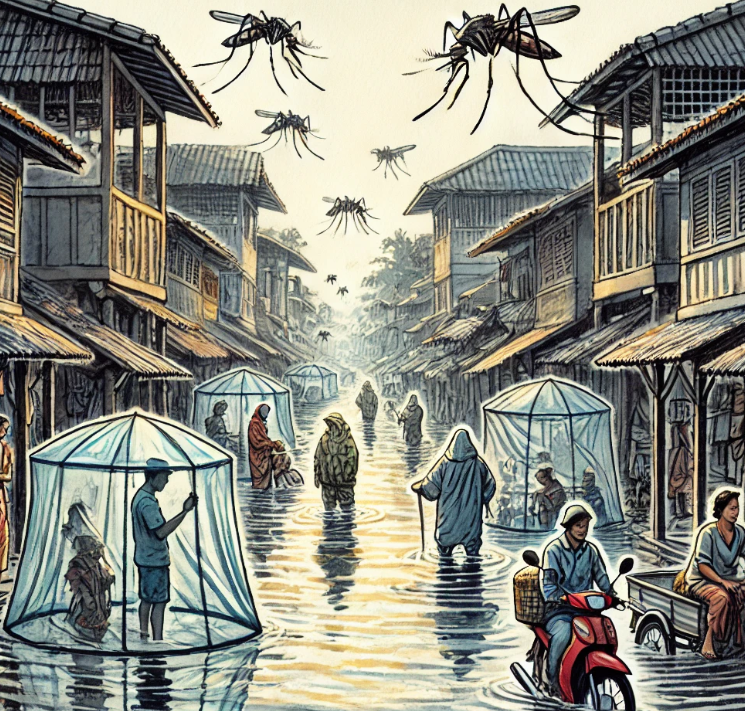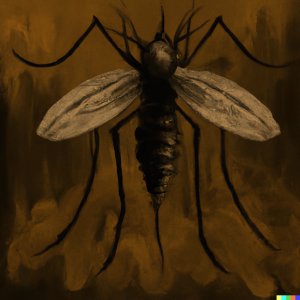
Dengue Fever: A Year-Round Threat in South Asia
In recent years, the notion of “seasonal” diseases has become increasingly irrelevant, particularly when it comes to dengue fever in South Asia. Traditionally considered a monsoon illness, dengue has now evolved into a persistent, year-round threat. The primary driver behind this alarming change is climate change, which has extended monsoon seasons, increased temperatures, and altered mosquito behaviors, making dengue a constant danger.
The Climate Change Connection
Prasad Phadke, Founder and CEO of Eco BioTraps, and Susanta Kumar Ghosh, Scientific Advisor and Former ICMR-National Institute of Malaria Research in Bangalore, highlighted the severity of the situation in an interview. They pointed out that November 2023 marked Bangladesh’s worst-ever dengue outbreak, with overflowing hospitals and a rising death toll, underscoring a significant departure from the expected seasonal patterns.
Historically, dengue outbreaks in South Asia were confined to the monsoon season, typically from June to September. During this period, stagnant water from heavy rains provided ideal breeding grounds for Aedes mosquitoes, the primary carriers of the dengue virus. However, climate change has disrupted these patterns. The monsoon season now extends beyond its traditional timeframe, and in July 2023, rainfall was 13 percent above the long-term average. This exacerbation has led to widespread flooding and unexpected outbreaks of mosquito-borne diseases in various districts of India and Pakistan.
Changing Mosquito Behaviors
Aedes mosquitoes have adapted to the new environmental conditions brought about by global warming. They are no longer restricted to clean water breeding grounds during the monsoon season. Instead, they have demonstrated a remarkable ability to breed in saline water, rendering conventional insecticides less effective. Over time, these mosquitoes have developed resistance to these chemicals, further complicating control efforts.
The experts emphasized that the concept of “seasonality” has lost its meaning as temperatures rise and rainfall patterns become erratic. Dengue is no longer confined to a specific time frame but has become a constant threat throughout the year. This prolonged exposure to mosquitoes increases the likelihood of contracting dengue, amplifying the public health crisis.
Addressing the Evolving Threat
Tackling this evolving threat requires a multifaceted approach that recognizes the interconnected nature of climate change and disease dynamics. Prasad Phadke and Susanta Kumar Ghosh proposed several strategies:
- Enhanced Surveillance and Monitoring Systems: Early detection of dengue outbreaks is crucial for mitigating the spread of the virus and alleviating the burden on healthcare systems. Improved surveillance and prompt response can help contain outbreaks more effectively.
- Innovative Mosquito Control Methods: Traditional vector control methods are becoming less effective due to the mosquitoes’ adaptability. Research into alternative control methods and innovative approaches to mosquito management is essential to keep pace with changing mosquito behaviors and environmental conditions.
- Public Awareness Campaigns: Educating communities about preventive measures against dengue is vital. Simple actions such as eliminating stagnant water, using mosquito nets, and wearing protective clothing can significantly reduce the risk of infection.
- Climate Change Mitigation: On a broader scale, addressing the root cause of the problem requires concerted global action to combat climate change. Reducing greenhouse gas emissions and investing in sustainable practices can limit global warming’s extent and its impact on public health.
The experts stressed that the traditional view of dengue as a seasonal disease is no longer tenable in the face of climate change. The convergence of environmental factors has transformed dengue into a year-round threat, posing significant challenges to public health systems in affected regions. To confront this crisis, a comprehensive approach encompassing surveillance, vector control, public awareness, and climate mitigation efforts is essential. Only through collective action can we hope to stem the tide of dengue and protect vulnerable communities from its devastating impact.
Public Health Implications
The shift of dengue fever to a year-round threat has profound public health implications. It strains healthcare systems, increases morbidity and mortality rates, and necessitates continuous vigilance and resource allocation. Addressing this issue also underscores the broader need for global action on climate change to prevent similar transformations in other vector-borne diseases.
Stay on the edge of Public Health News!
Be a health leader! Subscribe for free and share this blog to shape the future of public health.”
About the Author
Dr. Jonathan P. Scaccia, PhD, is a clinical-community psychologist with expertise in public health science and practice. He has led evaluation and research initiatives focusing on health equity, vaccine distribution, and organizational readiness. Dr. Scaccia has contributed to federal suicide prevention programs and vaccine equity strategies. He has been recognized for his impactful work and is a leading voice in advancing public health practices.



